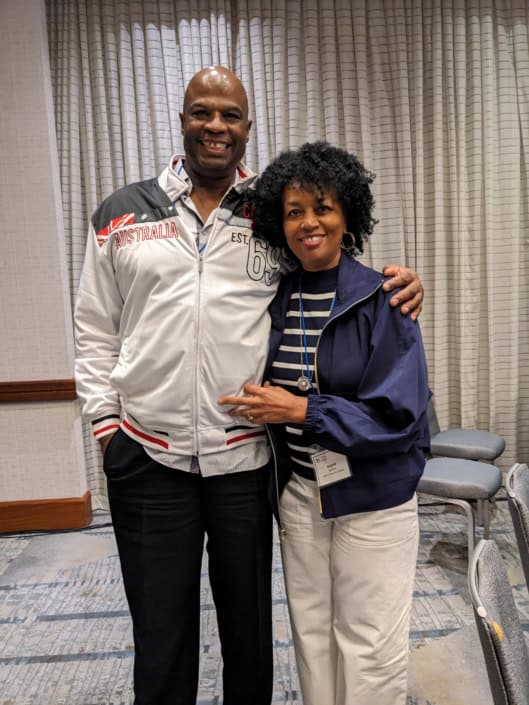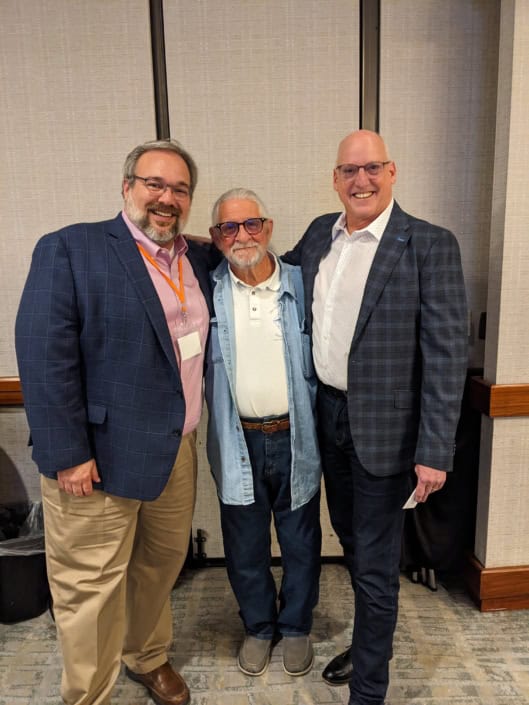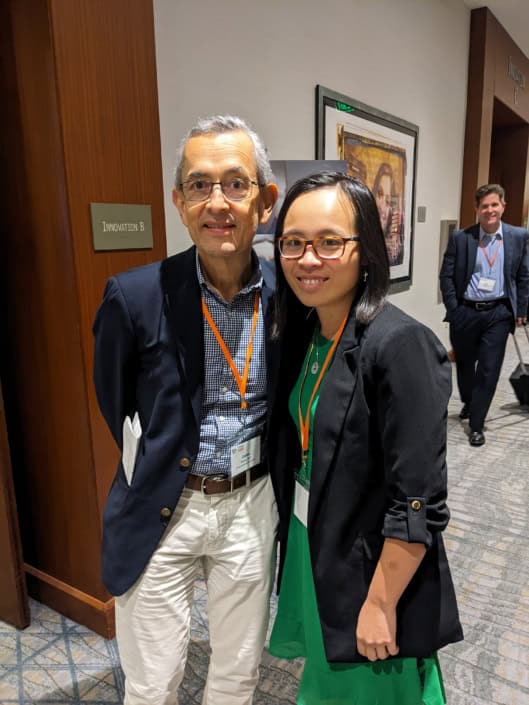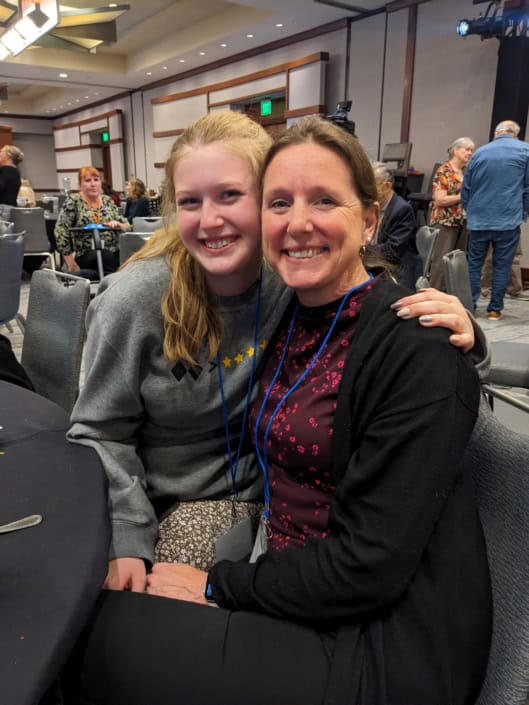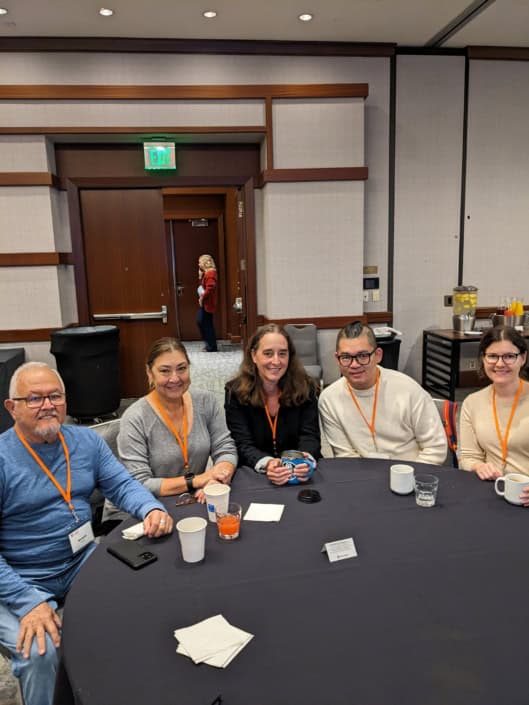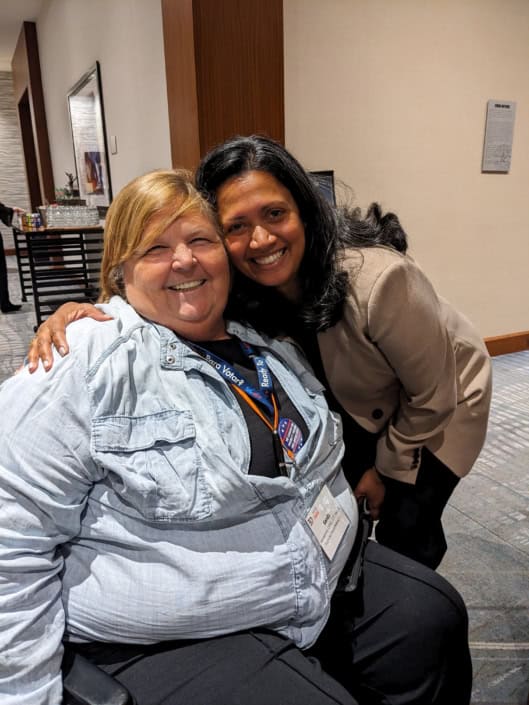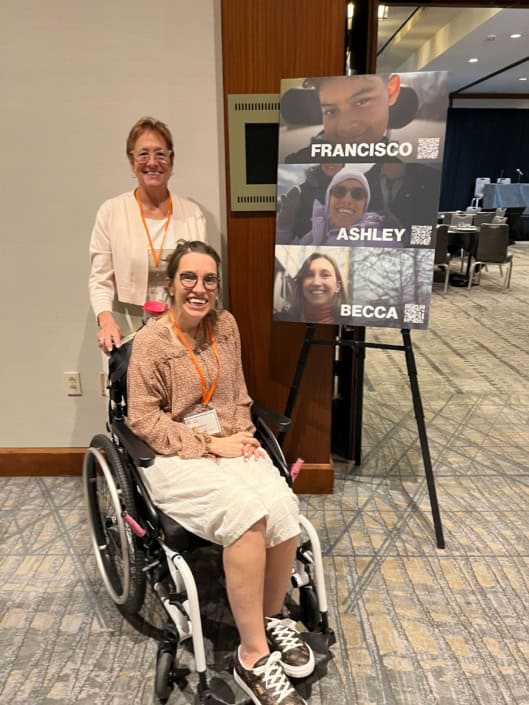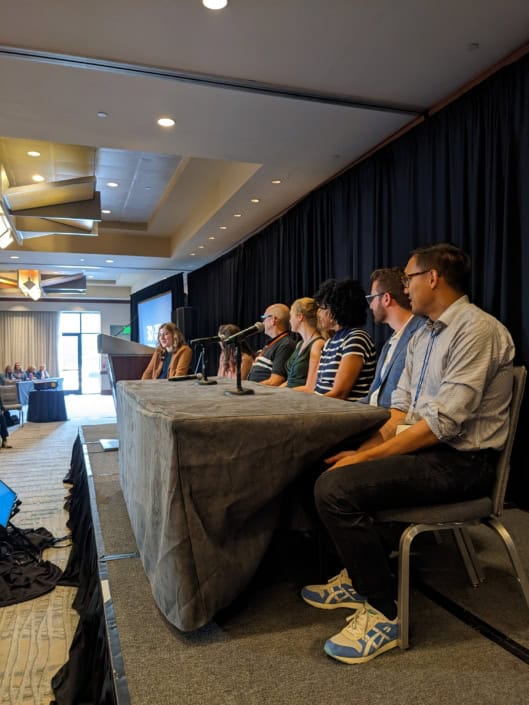Celebrating 30 Years of Progress at the 2024RNDS
From October 18th through October 20th, over 250 people gathered in Dallas and online for the three-day Rare Neuroimmune Disorders Symposium (RNDS) that the Siegel Rare Neuroimmune Association (SRNA) hosts every other year. Attendees included individuals with rare neuroimmune disorders, their loved ones and caregivers, and medical professionals who connected with one another and discussed rare neuroimmune disorders.
However, this year was special, we celebrated 30 years of impact since the birth of The Transverse Myelitis Association (TMA), now known as the SRNA, an organization of grassroots origin with Sandy and Pauline Siegel sitting at their kitchen table, taking calls from anyone, anywhere, who’d been impacted by rare neuroimmune disorders.
We gathered in-person at the Hyatt Regency DFW, and the symposium was also live streamed via Zoom so those unable to travel could participate. The program began with sessions focused on diagnosis and acute treatment of rare neuroimmune disorders. A panel of people diagnosed with ADEM, AFM, MOGAD, NMOSD, and TM was moderated by SRNA’s GG deFiebre, comparing the experiences of initial symptoms, acute treatment, and diagnosis. This was followed by a physician panel, comparing the different approaches that a healthcare team may take to the diagnostic journey of a patient with a rare neuroimmune disorder.
Community perspectives were woven throughout the 2024RNDS, with many sessions moderated by people diagnosed and their care partners alongside physician experts. Through this partnership, clinical presentations became practical discussions and addressed the whole-person experience of living with a rare neuroimmune disorder.
“I absolutely enjoyed the 2024RNDS. The experience was satisfying just to know that there is a community that can help you navigate through the process of dealing with someone with a rare disease. The information was very informative but the people I met is what made it even more awesome, they were all kind and helpful. I am so thankful that I was able to be a part of experience. I’m hoping to see everyone again and again because now I look at them as family.” – Ashley
“When my only four-year-old son was affected by acute flaccid myelitis, our world was turned upside down. I felt utterly alone, overwhelmed by sorrow and misery. Attending the symposium was a beacon of hope. Through the meet and greet sessions, I connected with others who are on similar journeys, and for the first time, I felt that my wife, my son, and I are not alone in this struggle. Despite being thousands of miles away in Sri Lanka, participating in the 2024RNDS made me feel embraced by a community, a family that understands and supports us. Words cannot express how grateful I am for the opportunity to connect with such compassionate people and for all the work you do with the SRNA community. SRNA have brought light and hope into our lives when we needed it most.” – Bhathiya
During the meeting, we discussed diagnostics advancements and treatments that 30 years ago, we could never have dreamed of. The medical and clinical innovations that grants like our Pauline Siegel Eclipse Fund for Research and James T. Lubin Fellowship fund can bring hope to all who have rare neuroimmune disorders, hope that even 15 years ago we did not have. There are so many more clinical trials today ensuring treatments continue to be developed for those with relapsing conditions or recent damage.
In addition to research, we learned about management of symptoms of rare neuroimmune disorders, such as bowel, bladder, and sexual dysfunction, vision issues, neuropathic pain and spasticity management, and so much more. One talk, “Adaptive Tools and Resources” by Sandy Hanebrink, showcased as many types of aids as there are disabilities. Discussions like this can make life for those with rare neuroimmune disorders easier.
In person attendees participated in breakout sessions where people with similar diagnoses gathered, asked questions and engaged with a panel of clinician-scientists regarding their diagnosis, symptoms, and treatments. This allowed people diagnosed to speak more directly with the experts and interact with each other to learn more. Simultaneously, a breakout session for caregivers focused on maintaining mental and physical health while dedicating time to caring for a loved one was live streamed. The discussion included coping strategies with other caregivers to avoid burnout and how to take care of themselves just as much as they care for the person impacted by a rare neuroimmune disorder.
“We really enjoyed the 2024RNDS! I’m so grateful for the chance to attend and just for the fact that it exists. I really enjoyed learning all about the new medication trials and research. My favorite thing was being able to see everyone that we have met in the SRNA community and meeting new people and physicians. I felt like I was meeting my idols with a few of the people that I got to meet, talk to, and listen to. It’s crazy reading their research and watching their previous RNDS recordings and then getting to meet them in person. Absolutely amazing! I’m so thankful for the SRNA and everyone who put together and contributed to this phenomenal and inspiring event. Being a parent to a child with a rare neuroimmune disease is hard. But being a part of the SRNA community makes it much easier, because we are not alone.” – Caitlyn
“I have learned so much more and many ideas have come forth through this conference not just to help me, but to help support my family and create a clear and concise communication with my care providers. Grateful for SRNA community and feel so inspired, and hopeful for the future. Thank you!!!” -Rosemary
“Our family felt very blessed to be able to attend 2024RNDS! Not only did we receive an abundance of helpful information for our daughter, but also for us as caregivers. Every time we attend an SRNA event, we feel more at home, loved, and accepted than we ever have. This is truly our family and our home.” – Laura
We partnered with Can Do Multiple Sclerosis (CDMS) to offer the TAKE CHARGE® Program for those diagnosed with rare neuroimmune disorders. This one-of-a-kind program to learn how to take charge of your disease, your healthcare, and your life was offered to in-person attendees. Lyd Lacey, SRNA volunteer and community member, shared their perspective: “The TAKE CHARGE® program connected me with other patients in a welcoming environment where we shared our experiences and lifted each other up. It was empowering to be given not just the tools to succeed, but also a community to support us. It was an amazing opportunity and I am so thankful to have been able to participate!”
Beyond all the panels, sessions, and discussions, something else magical always happens during events like these—it’s when people begin to talk to one another. One person who uses a wheelchair begins to talk to someone who uses a cane. People who haven’t seen each other in years spot one another from across the room and wave a hello, or excitedly begin to make their way over to each other. The information is amazing, the doctors are spectacular, but something about being with another person who has exactly what you have or something similar grants a feeling of peace—of home. We are all drawn together by unfortunate circumstances, but now, even for a few days, we are together. And we are all stronger together.
Thank you to Alexion AstraZeneca Rare Disease, Amgen Rare Disease, Genentech, UCB Pharmaceuticals, and Kennedy Krieger Institute for supporting the 2024RNDS.
If you attended the 2024RNDS, we would appreciate your feedback about your experience at the symposium and invite you to fill out this survey.
“SRNA was there at the very beginning of my journey as a rare patient when I was first diagnosed. This community has always been the most impactful in my personal story. Attending 2024RNDS was important to me because as a rare patient with seronegative NMOSD, I’m always interested in hearing about advances in antibody testing and treatments for patients like me that have no biomarker. Also, as the founder of a foundation in California actively working to shape health policy and legislation in our country, I was keen to hear about lived experiences from other rare neuroimmune patients and the challenges they face in their respective states so that we can communicate those issues to legislators across the country and translate that into actionable policy priorities and tangible outcomes for rare patients.” – Melanie (Mellie J Foundation)
“I reached out to SRNA to explore the wide range of adverse effects TM has on the population and to educate myself on these other diseases that are so closely related. While attending the conference I found much of the discussion to be above my mental capacity, but I’m glad that I at least exposed myself to all of the topics and specific vocabulary relating to NMOSD, MOGAD, ON and ADEM. I spent the immediate 4 months after my attack learning how to live as a paraplegic at Shepherd Center in Atlanta. Being around so much suffering from traumatic SCI, brain injury, and stroke made me realize how much worse things could always be. Meeting others within the SRNA community has allowed me to personally witness how each particular situation is not necessarily worse or better, but so drastically different for the individual and their family. I’m looking forward to future events and helping in any way possible.” – Ivan


